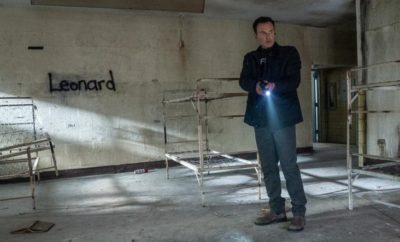Features
Fingersmith
By: MaryBeth McMahon
Playgoers local to Cambridge, MA found themselves enthralled by a rather devious and sensational tale set in Victorian era Britain. Fingersmith, a play boasting similarities to Charles Dickens’ Oliver Twist, played at the Harvard University’s American Repertory Theatre (A.R.T.) from December 4, 2016 to January 8, 2017. The gothic drama gave an air of thrilling mystery and darkness not commonly told in stories this time of year, contrasting the likes of Dickens’ lighthearted A Christmas Carol. During it’s run, this captivating story of betrayal and clandestine romance left sold-out audiences stunned by its unforeseen twists and turns. Audience members, both familiar and unfamiliar with the original work, were equally taken aback by the impressive adaptation of the Sarah Waters’ 2002 mystery novel of the same title.
With the award-winning author’s blessing, playwright Alexa Junge transformed Fingersmith into a similarly mesmerizing stage production. In collaboration with Bill Rauch, the Artistic Director of the Oregon Shakespeare Festival (OSF), Junge first gave life to the newly-adapted narrative at the OSF in 2015. After garnering immense success with the first production, Rauch reprised his role as Artistic Director during the Victorian piece’s return to stage at the A.R.T. in Cambridge.
The play begins in the slums of a London Borough on Lant Street, home to a group of common thieves. The Fagin-like Mrs. Sucksby (Kristine Nielson), a self-proclaimed “baby farmer,” takes in unwanted and orphaned babies while running the den of crooks. Among the group is the seventeen-year old pickpocket or “fingersmith,” Susan “Sue” Trinder (Tracee Chimo). Adopted by Mrs. Sucksby as a baby, the rough-edged Sue is deemed the perfect villain for a mysterious Gentleman’s (Josiah Bania) insidious proposal. Gentleman, an associate of the con artists, concocted a rather sinister plan to rob a young and wealthy heiress, Maud Lilly (Christina Bennett Lind), of her fortune. Sue is expected to pose as Maud’s new maid, gaining her trust so she can coax Maud into marrying Gentleman who is known by the Lilly’s as Mr. Richard Rivers. After Gentleman and Maud elope, he plans to steal her fortune when it becomes available on her eighteenth birthday and then swiftly throw her into the madhouse where her eccentric uncle, Christopher Lilly (T. Ryder Smith), will most likely not go looking for her. After some hesitation, Sue agrees to the underhanded plan, but only with the promise of three thousand pounds for her efforts.
Sue begins her position at Briar, the countryside home where a sheltered Maud lives with her uncle, acting as secretary in helping him write a dictionary of sorts. Although visibly uncomfortable and gawky in her newfound duties, Sue is eager to swindle the naïve and fragile Maud out of her money. In time; however, the two girls grow fond of one another and a blossoming friendship and simultaneous attraction ensues. Sue’s greed and resolve begin to weaken as she develops a sense of pity for Maud and the secluded life she has led.
During one of his final visits to Briar, Gentleman asks Maud for her hand in marriage, to which she reluctantly agrees. Maud is riddled with anxiety over her decision to wed Gentleman and is concerned over wedding night expectations. She and Sue can’t help, but give in to their feelings and go against “gravity” together, only making Sue further resent Gentleman and his scheme to deceive Maud. After the wedding, Sue hesitantly pushes forward with Gentleman’s plan to put Maud in the madhouse, but not without internally battling against every fiber of her being that now wants to do just the opposite.
In the final moments of the first act, a series of unpredictable and monumentally staggering events occur that change the entire course of this story. Not everything is as it seemed and the gripping drama relentlessly continues throughout the second act, during which the direct narration moves from Chimo to Lind, delving into Maud’s perspective while also revealing the villainous intentions of some seemingly unsuspecting characters.
Chimo’s dynamic physical and emotional performance, laced with moments of gratifying wit that brightened up the relatively dark nature of the show, duly embodied the sharp yet pure essence and spirit of the fearless protagonist Sue. Lind manifested the sophisticated Maud’s shifting qualities in seamless fashion, with refined mannerisms and speech, as well as nimble changes in tone that showed Maud was not quite the innocent young lady we thought. Bania’s portrayal of Gentleman as a whimsical and nefarious scoundrel, with a glossy charm, made it easy to both marvel at and loath his villain. Nielsen brought Mrs. Sucksby to life with sincere maternal quirks that were remarkably augmented by the character’s deceitful trickery, which peculiarly revealed the good heart that she did, in fact, possess.
Christopher Acebo’s multi-purpose and two-story set design gave way to flawless transitions to and from a slummy sanctuary, a lavish manor and a bleak asylum. The half-stage turntable acted as a Lazy Susan, with every motion bringing to each scene a new course of actors, props and period furniture relative to the backdrop. Deborah Dryden’s costumes exquisitely brought this period piece to life with impeccable designs symbolic of class differences. Jen Schriever’s lighting was impactful and gloomy, casting moody glows upon the bleak settings and creating warmth in those tender moments shared between the two leads. Shawn Sagady’s video design consisted of visionary projections that further established setting and provided imagery for the darker moments of hangings and a drowning, where the pained characters were grounded to the Earth by gravity, one of the show’s recurring motifs.
The play successfully portrayed the book’s notable nineteenth-century themes of class differences, gender and sexuality by means of a tense plot and compelling direct-address narration. Although fast-paced at times, Rauch’s stage adaptation appropriately paid homage to the dramatic crime novel while also adding moments of playfulness and sincere charm, unique to the playwright Alexa Junge’s vision.
From start to finish, the audience was on the edge of their seats, unable to anticipate the unpredictable turn of events. The hearts of people unfamiliar with the book raced in anticipation of the shifts in tone and perspective during the tumultuous and unforeseeable crises. And those familiar with the book were equally blown away by the resoundingly fresh and loyal adaption of Waters’ spellbinding tale.
A.R.T.’s production of Fingersmith was an absolute “pearl” that gave playgoers, actors and crewmembers memories to fondly hold onto for years to come. “Gloves” off to the entire team who worked tirelessly on bringing this story of deception and redemption to life.





You must be logged in to post a comment Login